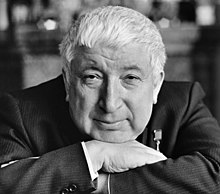Rasul Gamzatov
You can help expand this article with text translated from the corresponding article in Russian. (July 2017) Click [show] for important translation instructions.
|
Rasul Gamzatov | |
|---|---|
Расул Гамзатов ХӀамзатазул Расул | |
 | |
| Born | 8 September 1923 |
| Died | 3 November 2003 (aged 80) |
| Occupation | Poet |
| Title | Hero of Socialist Labour (1974) |
| Awards |
|
Rasul Gamzatovich Gamzatov (Avar: ХӀамзатазул Расул ХӀамзатил вас, romanized: Ħamzatazul Rasul Ħamzatil vas, IPA: [ħamzatil rasul]; Russian: Расу́л Гамза́тович Гамза́тов; 8 September 1923 – 3 November 2003) was a Avars poet. Among his poems was Zhuravli, which became a well-known Soviet song.[1]
Life
[edit]Gamzatov was born on 8 September 1923 in the Avar village of Tsada in the north-east Caucasus. His father, Gamzat Tsadasa, was a well-known bard, heir to the ancient tradition of minstrelsy still thriving in the mountains.[2] He was eleven when he wrote his first verse about a group of local boys who ran down to the clearing where an airplane had landed for the first time. A number of different poems by him also became songs, such as Gone Sunny Days.
In 1939 he graduated from Pedagogical College. He had various jobs serving as a school teacher, an assistant director in the theater, a journalist in newspapers and a radio host. From 1945 to 1950 he studied at the Maxim Gorky Literature Institute.
Gamzatov was awarded the State Stalin Prize in 1952, The Lenin Prize in 1963, and Laureate Of The International Botev Prize in 1981.
Gamzatov died on 3 November 2003 at the age of 80 in the Moscow Central Clinical Hospital. He was buried in the old Muslim cemetery in Tarki, next to the grave of his wife.
A monument to Gamzatov was unveiled on 5 July 2013 on Yauzsky Boulevard in central Moscow.[3]
Honours and awards
[edit]


- Hero of Socialist Labour (27 September 1974)
- Order of St. Andrew (8 September 2003) – for outstanding contribution to the development of national literature and public activities[4]
- Order of Merit for the Fatherland, 3rd class (18 April 1999) – for outstanding contribution to the multinational culture of Russia
- Order of the Friendship of Peoples (6 September 1993) – for outstanding contribution to the development of the multinational Soviet literature and productive social activities
- Four Orders of Lenin
- Order of the October Revolution
- Order of the Red Banner of Labour, four times
- Order of Peter the Great
- Order of Saints Cyril and Methodius (Bulgaria)
- Lenin Prize (1963) – for the book "High Star"
- Stalin Prize, third class (1952) – a collection of poems and the poems "The year of my birth"
- State Prize of the RSFSR, Gorky (1980) – for the poem "Take care of mothers'
- People's Poet of Daghestan
- International Award for "Best Poet of the 20th century"
- Writers Award in Asia and Africa "Lotus"
- Jawaharlal Nehru Award
- Ferdowsi Award
- Award of Hristo Botev
- International Prize Sholokhov in art and literature
- Award Lermontov
- Award Fadeeva
- Award Batyr
- Award Mahmoud
- C. Award Stalskiy
- G. Award Tsadasy
- Order of the Golden Fleece (Georgia)
References
[edit]- ^ Elena Polyudova (2016). Soviet War Songs in the Context of Russian Culture. Cambridge Scholars Publishing. p. 178. ISBN 978-1-443-88974-2.
- ^ Tatiana Smorodinskaya (2013). Encyclopedia of Contemporary Russian Culture. Routledge. p. 225. ISBN 978-1-136-78785-0.
- ^ "Unveiling of a monument to Rasul Gamzatov". kremlin.ru. 5 July 2013. Retrieved 11 February 2017.
- ^ "President Vladimir Putin wished Dagestan poet and public figure Rasul Gamzatov a happy 80th birthday". kremlin.ru. 8 September 2003. Retrieved 11 February 2017.
External links
[edit]- http://www.gamzatov.ru – Official site, coordinated by Ministry of national politics, information and foreign affairs of Dagestan (in Russian and in English).
- Gamzatov poetry
- http://gazeta.ru/2003/11/03/umerrasulgam.shtml – Necrology at http://gazeta.ru (in Russian)
- https://web.archive.org/web/20040707115614/http://www.dagpravda.ru/ob/rasul01-11-03.htm – Obituary in "Dagestanskaja Pravda" (in Russian)
- 1923 births
- 2003 deaths
- People from Khunzakhsky District
- Avar people
- Communist Party of the Soviet Union members
- Sixth convocation members of the Soviet of the Union
- Seventh convocation members of the Soviet of the Union
- Eighth convocation members of the Soviet of the Union
- Ninth convocation members of the Soviet of the Union
- Tenth convocation members of the Soviet of the Union
- Eleventh convocation members of the Soviet of the Union
- Soviet poets
- Soviet male writers
- 20th-century Russian male writers
- Russian male poets
- Poets from Dagestan
- Heroes of Socialist Labour
- Recipients of the Stalin Prize
- Recipients of the Order "For Merit to the Fatherland", 3rd class
- Recipients of the Order of Friendship of Peoples
- Recipients of the Order of Lenin
- Recipients of the Order of the Golden Fleece (Georgia)
- Recipients of the Order of the Red Banner of Labour
- Recipients of the Lenin Prize
- Maxim Gorky Literature Institute alumni
